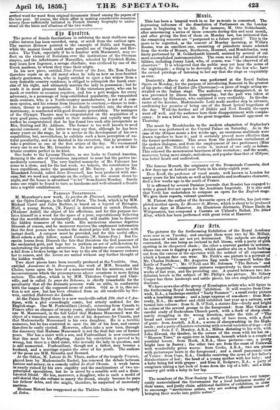PARLSLAN THEATRICALS.
3f. Meyerbeer's new work, Le pardon de Ploernwl, recently produced at the Opera Comique, is the talk of Paris. The book, which is by MM. Michael Carre and Jules Barbier, is based on a legend of Bretagne. noel, a young Breton, (M. Faun) is determined to enrich Dinorah, (Madame Aubel) the object of his affections, and for this purpose iso- lates himself in a wood for the space of a year, superstitiously believing that the mortification voluntarily endured, will enable him to discover the hidden treasures of the earth. His mysterious absence deprives Dinorah of reason, and he moreover receives the unpleasant information that the first person who touches the desired prize will be smitten with instant death. A catspaw must be provided, and for this useful office, Heel selects a silly fellow, named Corantin (M. Sainte-Foy.) But Co- re:rain learns from Dinorah the fate that threatens the first possessor of the enchanted gold, and begs her to perform an act of self-devotion by undertaking the perilous adventures. In her madness she consents, but a fall from a broken bridge on her way to the site of the treasure restores her to reason, and the lovers are united without any further thought of the hidden wealth.
Two short pieces have been recently produced at the Varietes. One, entitled Amoureux de la Bourgeoise, the work of MM. Siraudin and Choler, turns upon the love of a man-servant for his mistress, and the inconveniences which the presumptuous adorer occasions to more fitting suitors. The other, which is by MM. Theodore Cognard and (flair- vile, nd is called Le pays des Echasses, is chiefly remarkable for the peculiarity that all the dramatis persona walk on stilts, in conformity with the usages of the supposed scene of action. Odd as it is, this no- tion is not new, but has been obtained from an old vaudeville by Ser- vrin, entitled Habitants des Landes.
At the Palais Royal there is a new vaudeville called Elle &tit bigue, with a plot exceedingly comic, but utterly unfitted for the English stage. One M. Fonbouillant (Arnal), returning from Canada to France after an absence of twenty years, plants himself at the house of one M. 3lauconseil, in the full belief that Madame Mauconseil was the object of a transient amour, on the eve of his departure for Canada, and that Mademoiselle Maueonseil is his own daughter. He is a terrible nuisance, but he has contrived to save the life of his host, and cannot therefore be easily ejected. However, affairs take a new turn, through the discovery that Madame Mauconseil is not the frail fair one of former years. She has a sister with a son, and Fonbouffiant is now convinced that this must be his offspring. Again his conviction is proved to be wrong, but there is a third sister, who is really the lady in question, and is still unmarried. Fonbouillant, though not a father, may become a husband, and a marriage repairs the error of his youth. The authors of the piece are MM. Siraudin and Bernard. At the Odeon, hi. Latour de St. Ybars, author of the tragedy Virginia, played here by Mademoiselle Rachel, has renewed the debate between honour and money, in a comedy called Le droit Chemin. A weak baron is nearly rained by his own cupidity and the machinations of two un- principled speculators, but he is saved by a sensible wife and a disin- terested friend. He has, moreover, a daughter, who is such a model of self-denial that she refuses to marry the friend, simply because he pays her fathers' debts, and she might, therefore, be suspected of mercenary motives.
Madame Ristori has reappeared at the Theatre Italien in the tragedy of Fedra.


























 Previous page
Previous page